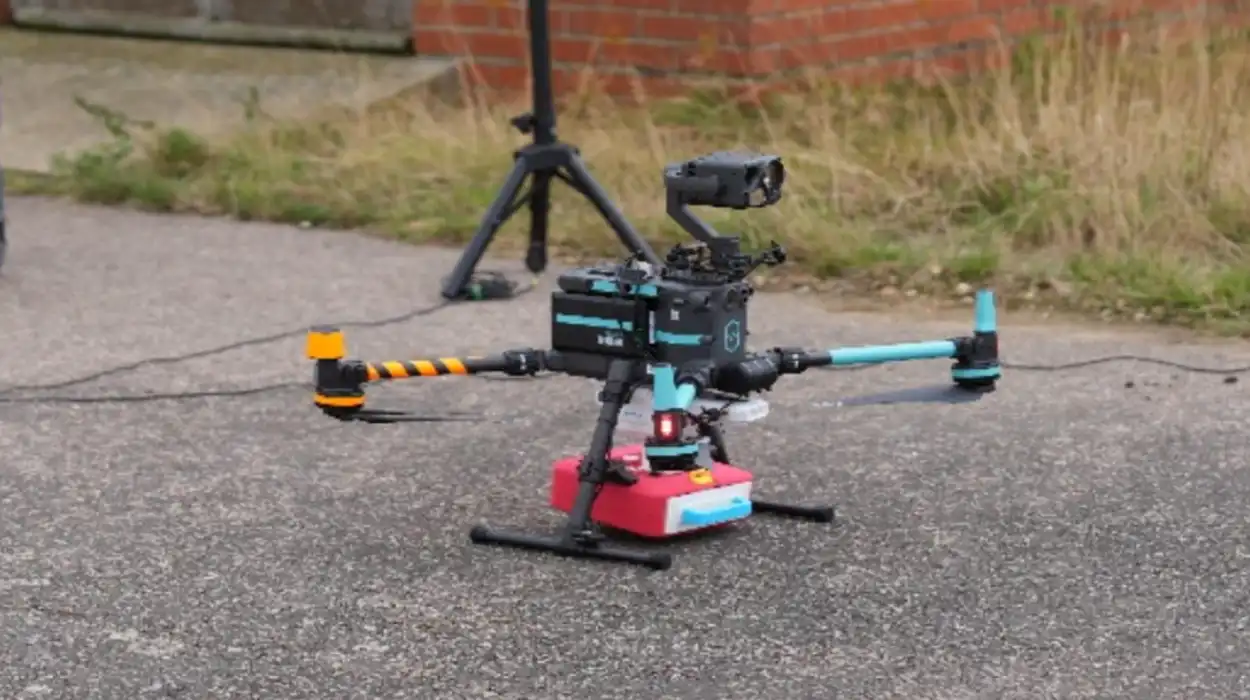UK (Parliament Politics Magazine) – NHS explores drone delivery of defibrillators, aiming to cut response times and increase survival chances for heart attack patients.
As reported by The Independent, the NHS may deploy drones to deliver defibrillators quickly, reaching heart patients faster than ambulances.
What did the University of Warwick study reveal about drone defibrillators?
A University of Warwick study, funded by NIHR, trialled drones to deliver medical aid in rural areas, addressing ambulance delays on winding roads. The team reported drones performed “very promisingly” during emergency tests.
Each year, fewer than 10% of over 30,000 people in the UK survive a cardiac arrest outside the hospital. A heart attack can cause the heart to stop beating. But if a defibrillator is used within minutes, the chances of survival more than double.
Researchers tested drones in a rural area, instructing volunteers to dial 999 after finding a CPR mannequin, simulating real-life emergencies. The control centre dispatched a drone equipped with a defibrillator to the scene.
The drone flew to the site and carefully lowered the defibrillator safely to the ground. Volunteers were guided by ambulance staff while performing CPR on the mannequin. The first defibrillator shock was delivered in less than ten minutes after the 999 call.
The Welsh Ambulance Service and SkyBound drones tested the system, with plans for larger national trials.
What did Dr Christopher Smith say about drone defibrillators saving lives?
Dr Christopher Smith, the chief investigator, stated,
“Ambulance services work as swiftly as possible to get to patients who have suffered cardiac arrests. However, it can sometimes be difficult to get there quickly. AEDs [automated external defibrillators] can be used by members of the public before the ambulance gets there, but this rarely happens. We’ve built a drone system to deliver defibrillators to people having cardiac arrest, which could help save lives.”
He added,
“We have demonstrated that drones can safely fly long distances with a defibrillator attached and maintain real-time communications with emergency services during the 999 call. We are in a position where we could operationalise this system and use it for real emergencies across the UK soon.”
Stephen Kinnock’s views on drones helping patients faster
Stephen Kinnock, a health minister, stated,
“I want Britain at the forefront of this technological revolution to transform patient care.”
He added,
“Drone technology has the potential to help reach patients faster, especially in rural communities. This government is backing our country’s leading scientists to research, test, and develop new forms of emergency healthcare which have the potential to save lives.”
What can the new AI stethoscope detect in patients’ hearts?
Doctors have created an AI stethoscope that detects three heart conditions in 15 seconds. Researchers at Imperial College London have developed a stethoscope that detects subtle heartbeat changes and records a rapid ECG.
Catching heart problems early, like heart failure, valve issues, or irregular heartbeats. This helps patients get treatment quickly and stay safer.
A study tried the AI stethoscope on 12,000 patients at 200 GP clinics, especially those feeling short of breath or very tired.. Patients checked with the new AI stethoscope were twice as likely to be diagnosed with heart failure. This is compared to those not using the tool.
Wes Streeting’s stance on modernising the NHS
Health and Social Care Secretary Wes Streeting stated,
“We are bringing our analogue NHS into the digital age. Our Plan for Change will rebuild our NHS, put patients in control of their own healthcare and arm staff with the latest groundbreaking technology, ending the needless bureaucracy faced by patients up and down the country.”
He added,
“We’ve already set out plans to transform the NHS App so patients can choose providers and book appointments, and we’re harnessing artificial intelligence to deliver faster and smarter care across the country. By embracing technological advancements, we can both make substantial savings for the taxpayer and build a health service fit for the 21st Century.”
Key facts about heart patients in the UK
Around 7.6 million people in the UK live with heart and circulatory diseases, including 4 million men and 3.6 million women. About 2.3 million have coronary heart disease, with 1.5 million men and 830,000 women.
Cases are expected to rise by 1 million by 2030. By 2040, the number could increase by 2 million.


